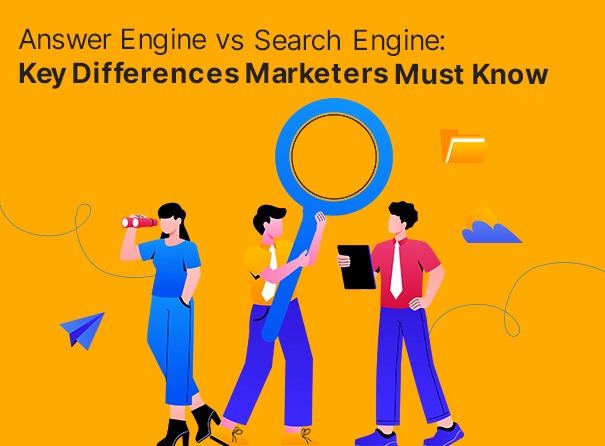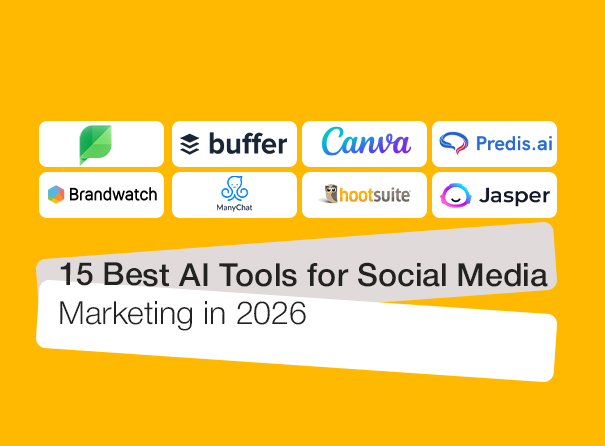TL;DR: - In 2025, the Answer Engine vs Search Engine debate is reframing digital marketing. Conventional search engines like Google continue to yield ranked links according to SEO indicators like keywords, backlinks, and site load times. By contrast, answer engines like ChatGPT, Perplexity, and Google AI Overviews produce immediate, AI-driven answers—driving the emergence of Answer Engine Optimization (AEO). For marketers, this translates to optimizing for both: SEO maintains visibility on SERPs, and AEO makes your brand the direct answer in zero-click queries. Structured data, E-E-A-T, and conversational, answer-ready content now take center stage. The future isn't SEO vs. AEO—it's combining both to succeed in an AI-driven search environment.
Introduction
Search has continuously changed, but 2025 is the turning point. Conventional search engines such as Google continue to deliver ranked links, while answer engines powered by AI like ChatGPT, Perplexity, and Google AI Overviews offer direct, immediate answers. For marketers, this change implies that SEO alone no longer cuts it. The future is Answer Engine Optimization (AEO)—developing structured, reputable, answer-ready content for AI-fueled search.
At Inqnest, we assist brands in keeping pace with this change through customized Integrated Digital Marketing services that seamlessly integrates SEO, AEO, and content tactics to future-proof visibility in an AI-first era.
What is a Search Engine?
Search engines such as Google, Bing, and Yahoo have been the pillars of online discovery since many years. They crawl web pages in millions, index content, and rank results based on algorithmic signals. Users submit a query, and in turn, they receive a ranked list of links—occasionally topped by ads, shopping carousels, or videos.
This "blue link era" has shaped how companies create visibility online. A small Brooklyn bakery optimizing for "best cupcakes near me" and a SaaS behemoth optimizing for "cloud security solutions" both depend on conventional search engine optimization (SEO) to stand out.
How Search Engines Rank Content
The search engine ranking system runs on keywords, backlinks, and on-page optimization. Mobile responsiveness, site speed, and domain authority also play critical roles.
In summary:
- You establish relevance with keywords.
- You establish authority with backlinks.
- You establish trust with technical performance.
That's the formula behind SEO success—a model that's succeeded for over two decades. But the game is changing.
What is an Answer Engine?
Enter the disruptors: answer engines. These computer-powered systems bypass the list of links and deliver the answer straightaway. Sites like ChatGPT, Perplexity.ai, You.com, Neeva, and even Google's AI Overviews are turning the script around.
Imagine asking: "What's the healthiest late-night snack?" Rather than browsing health blogs, you receive a brief AI-written answer: "Greek yogurt with berries, because it's high in protein and low in sugar." That's the promise of convenience from answer engines.
How Answer Engines Source and Rank Content
Answer engines rely on structured data, contextual AI logic, and signals of credibility. They don't merely match keywords; they understand intent, assess trust, and deliver responses in natural, conversational language.
That's why schema markup and E-E-A-T (Experience, Expertise, Authoritativeness, Trustworthiness) are not optional for 2025. If your content is neither structured nor authoritative, answer engines won't select you.
So, the most significant distinction between Answer Engine and Search Engine comes down to content sourcing:
- Search engines = algorithmic signals + backlinks.
- Answer engines = structured data + clarity + contextual authority.
Key Differences Between Answer Engines and Search Engines
Handling User Intent
- Search Engines: Decode keywords and map them to indexed content. A search such as "running shoes under $100" provides e-commerce links.
- Answer Engines: Interpret conversational intent. A query such as "best running shoes for flat feet under $100" returns a tailored suggestion.
Search Results Format (Direct Answers vs Links)
- Search Engines: You are presented with ranked blue links, ads, snippets, and carousels.
- Answer Engines: You receive a direct answer—no clicking necessary.
Speed, Personalization, and AI Capabilities
- Search Engines: Quick, but typically generic with light personalization.
- Answer Engines: Extremely personalized, varying answers depending on context and wording.
Ranking Algorithms and Data Sources
- Search Engines: Rely on crawlers, backlinks, and keyword-dense indexing.
- Answer Engines: Bank on structured data, authenticated sources, and AI interpretation.
In short, search engines assist you in finding content; Answer engines assist you in consuming it instantly.
SEO vs AEO: What Marketers Need to Know
Answer Engine Optimization (AEO) vs Search Engine Optimization (SEO)
Consider SEO as appearing on stage and AEO as having the mic. Without SEO, your company is not visible, but without AEO, you will not be the one AI chooses to quote. The difference is in the emphasis: SEO is keyword ranking and traffic driving, whereas AEO is structuring content so that AI systems can read it easily and display it as the authority answer. SEO continues to live on click-throughs and traffic increases, while AEO gains trust through citations, mentions, and trust signals—even in zero-clicks when the user never navigates away from the results page.
Content Strategy Implications
For marketers in 2025, content strategy requires a serious upgrade. Rather than counting on keyword-rich posts, the focus now moves toward developing topic clusters that address topics in depth and establish authority. In these clusters, brands need to create "answer-ready nuggets" in the shape of FAQs, summaries, and well-organized explanations. The ideal approach balances long-form, detailed guides with modular, micro-answers. This hybrid approach not only pleases old-school search engines but also means AI-powered answer engines can rapidly pull out and present your content.
Practical Tips for Marketers in 2025
- Optimizing for Answer Engines: - When dealing with Answer Engine Optimization (AEO), accuracy is key. Content should be machine-formatted and human-natural. The inclusion of structured data in the form of FAQ schema provides AI engines with the information they require to properly interpret your content. Composing in a conversational, human-centered voice makes the content more readable orally for voice search or visually for AI summarization. Injecting brief, memorable responses—preferably 40–60 words—throughout your content makes it more likely to be directly displayed in AI answers.
- Optimizing for Traditional Search Engines: - That's not to say old-school SEO is dead—it just requires tweaking. On-page optimization is still a staple, with crisp H2 and H3 titles, thoroughly researched keywords, and uniform styling. Backlinks from established sites still establish credibility, while in-depth guides show mastery and topical prominence. Even as AI becomes the face of search, these core SEO building blocks continue to boost a brand's online visibility.
- Merging Both Strategies for Optimal Reach: - The brightest marketers in 2025 aren't deciding between AEO and SEO—they're embracing both as part of a unified, integrated strategy. SEO builds credibility and authority in the search engines, and AEO offers immediate visibility in zero-click, AI-powered search results. Combined, these strategies guarantee your content is found by users on every platform, whether they're glancing through Google's SERPs or seeking their AI assistant's recommendation. This combination of SEO and AEO is the key to remaining visible, trusted, and competitive in the changing search environment.
Future Trends and What to Look Forward To
Answer engines are not out to destroy search engines—they're becoming part of them. Google's AI Overviews already bring the two realms together: AI summaries piled on top of conventional search results.
What's next?
- AI usage across industries (healthcare, retail, B2B SaaS).
- New ranking factors developed exclusively for answer engines.
- Analytics capabilities that monitor AI citations just like we used to monitor backlinks.
For marketers, flexibility is everything. And yes, even responsive search ads will change with AI influencing queries in real time.
Conclusion
The future of search isn't ranking—it's being selected as the answer. Good old-fashioned SEO still holds value, but Answer Engine Optimization (AEO) is no longer negotiable in the AI-first world. Companies that move early—reframing content, implementing schema, and prioritizing AI-ready clarity, will own the zero-click future.
At Inqnest, we understand the change can be daunting, but it's exhilarating, too. With the perfect blend of SEO and AEO, brands don't merely weather change—thrival in change. It's no longer "Will you rank on page one?" but now "Will you be the answer?"
Ready to take your place as the answer? Let's make it real.
FAQs
1. What is the main difference between an Answer Engine vs Search Engine?
Search engines (Google, Bing) provide a ranked list of links based on SEO signals.
Answer engines (ChatGPT, Perplexity, Google AI Overviews) provide a direct, AI-generated answer with no clicking required.
2. What is Answer Engine Optimization (AEO), and how is it different from SEO?
SEO (Search Engine Optimization) is keyword-focused, backlinks, and search ranking traffic.
AEO (Answer Engine Optimization) makes content answer-ready, authoritative, and well-structured so that AI systems quote it in answers.
3. Why should zero-click searches matter most to marketers in 2025?
Almost 65% of all queries never exit the results page. Showing up now hinges on whether your content is quoted in an AI-driven search answer, or not even whether it shows up in blue links, ranked.
4. How do answer engines determine what content to display?
They are based on organized data, conversational understanding, and E-E-A-T indicators (Experience, Expertise, Authoritativeness, Trustworthiness), not keywords alone.
5. Must marketers drop SEO and only do AEO?
No. The best solutions combine SEO + AEO: SEO establishes long-term trustworthiness, while AEO provides visibility in AI-powered, zero-click scenarios.











.png)









.jpg)


.png)
.png)
.png)

.png)
